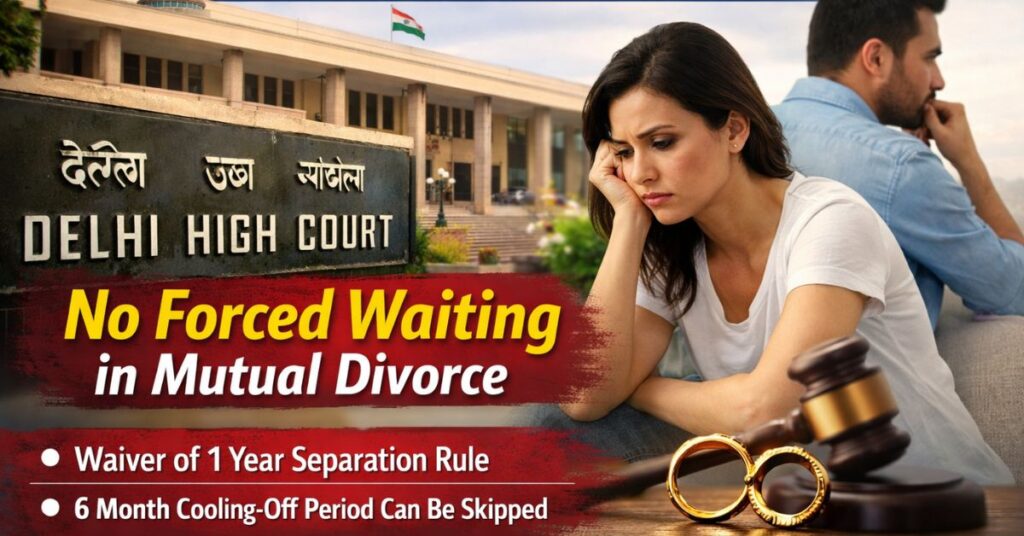Introduction
In a significant ruling on May 7th, 2019, the Delhi High Court set a precedent by waiving the statutory waiting period of six months for mutual divorce under Section 13B(2) of the Hindu Marriage Act, 1955. The case involved a petitioner seeking the dissolution of marriage by mutual consent, and the court’s decision opens the door for similar cases in the future.
Understanding the Background
The case, CM (M) 684/2019, involved a petitioner, identified as J.S.V., and a respondent, V.P.G., who got married on July 27, 2017, but started living separately from October 25, 2017. They initiated divorce proceedings under the Domestic Violence Act, 2005, and subsequently settled their disputes through mediation, recorded in a Memorandum of Understanding (MOU) dated October 10, 2018. The MOU outlined mutual consent for divorce and the payment of ₹3,50,000/- by the respondent to the petitioner in installments.
The First Motion and Waiver Application
The parties moved a petition under Section 13B (1) of the Hindu Marriage Act before the Family Court. On November 22, 2018, the petition was allowed, and it was recorded that the statutory requirements of Section 13B (1) had been fulfilled. However, due to Section 13B (2), the petitioner needed to file a second motion petition within the specified time frame.
On December 20, 2018, the parties jointly filed an application to waive the six-month statutory period mentioned in Section 13B (2). They relied on the Supreme Court judgment in Amardeep Singh v. Harveen Kaur (2017) 8 SCC 746. However, the Family Court adjourned the matter to April 27, 2019, indicating that the composite period of 18 months of separation had not lapsed by then.
The Family Court's Interpretation
The Family Court, relying on Amardeep Singh, held that the parties were not entitled to the benefit of waiver since the 18-month statutory period had not expired before the filing of the first motion petition. The court dismissed the application, citing that 13 months of separation had passed at the time of filing the first motion.

Delhi High Court's Ruling
The petitioner, represented by Mr. Jitender Singh, appealed the Family Court’s decision before the Delhi High Court. Mr. Singh argued that as 18 months had now elapsed since the parties started living separately, the application for a waiver of the six-month period should have been allowed. The respondent, represented by Mr. Dhiraj Kumar, did not oppose the petition.
Holistic Interpretation and Landmark Decision
The Delhi High Court analyzed the Supreme Court’s judgment in Amardeep Singh and observed that an unduly literal interpretation, such as the one by the Family Court, could nullify the purposive interpretation preferred by the apex court. The court emphasized that the waiting period was intended to explore reconciliation possibilities but not to prolong purposeless marriages with no chance of reunion.
The court found that the parties had genuinely settled their differences through mediation, and there was no likelihood of reconciliation. Additionally, the petitioner expressed an intention to marry another individual, and the mandatory six-month period would only prolong her agony.
The Verdict
Based on a holistic reading of the Amardeep Singh judgment, the Delhi High Court allowed the petitioner’s application for waiver of the mandatory six-month period. The court held that the waiting period mentioned in Section 13B (2) of the Hindu Marriage Act is not mandatory but directory. Furthermore, the court took into account that the 18-month statutory period had already elapsed on April 25, 2019. As the conditions for waiver were satisfied, the court exercised its discretion and waived the waiting period.
Conclusion
The Delhi High Court’s landmark ruling in CM (M) 684/2019 sets a precedent for future cases involving mutual divorce. The court’s emphasis on a purposive interpretation of the law ensures that purposeless marriages without chances of reconciliation need not be prolonged unnecessarily. This decision provides hope for individuals seeking mutual divorce and facing a statutory waiting period, as courts can now exercise their discretion based on the merits of each case. With the court’s recognition of the expiration of the 18-month statutory period, it reinforces the importance of considering the context and circumstances of each case while dealing with mutual divorce petitions.



